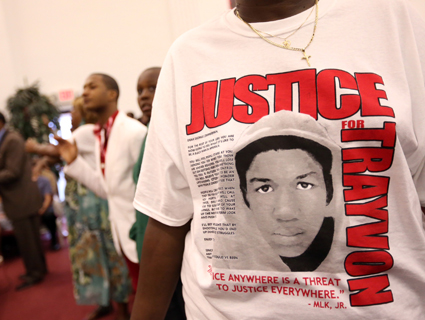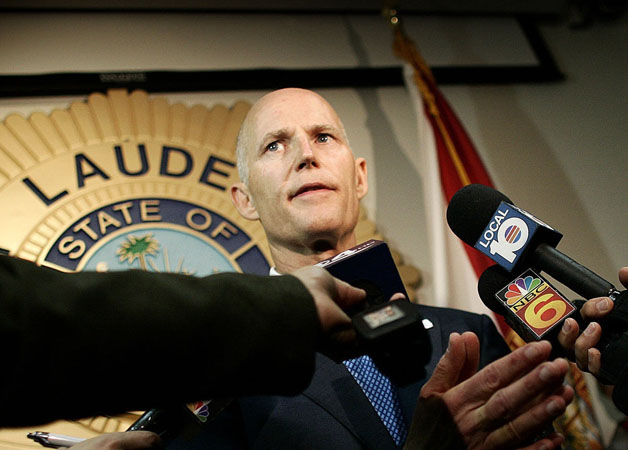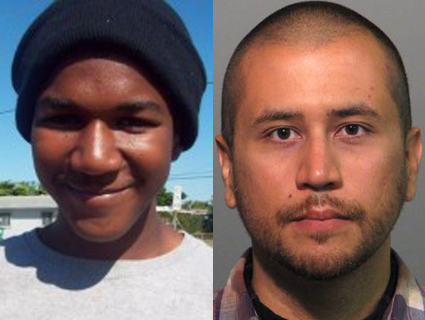
Florida state attorney Angela CoreyGary W. Green/Orlando Sentinel/Zumapress.com
Florida is working hard these days to make itself a case study argument in favor of abolishing the death penalty. In a state that has seen more innocent people exonerated from death row than any other in the country, lawmakers last year passed legislation to try to speed up the pace of executions. Last month, Gov. Rick Scott (R) set a dubious record for presiding over more executions in his first term than any governor since the death penalty was reinstated in 1976.
Meanwhile, the state continues to ignore US Supreme Court rulings banning the execution of the mentally ill and intellectually disabled. Just last week, the state argued before the Supreme Court that it didn’t want to use accepted scientific principles to comply with the court’s ban on executing mentally disabled people because that would spare too many death row residents, a move that would be “inconsistent with Florida’s purposes.” And now comes the news the state’s most notorious prosecutor has not only sent a disproportionate number of felons to death row, but a disproportionate number of African-Americans, once again raising the troubling issue of racial disparities in the state’s capital punishment system.
Angela Corey is the elected state attorney for the Fourth Judicial Circuit. She has been in the national spotlight ever since Scott tapped her to handle the prosecution of George Zimmerman. According to a new analysis by the Florida Times-Union, Corey has sent 21 people to death row since 2009, more than any other prosecutor in the state. That figure accounts for 25 percent of all death sentences in the entire state since 2009, even though Corey’s jurisdiction represents only 5 to 6 percent of the population and accounts for 8 percent of Florida’s murders. According to the American Civil Liberties Union, of the 21 men Corey’s office has sent to death row, 66 percent are African-American, even though blacks make up only 16 percent of the state’s population and a quarter of the population of the Fourth Judicial District where Corey serves. (Corey didn’t respond to the Times-Union‘s requests for comment, nor did her office reply an inquiry from Mother Jones.)
Those figures aren’t especially surprising given the state’s history. Over and over again, task forces have examined the state’s capital punishment system and found that racial biases are endemic. In 2000, even the administration of Gov. Jeb Bush (R), which studied the issue, had to concede that the state had never executed a white person for killing a black victim, and earlier studies found that a defendant was 3.4 times more likely to face a death sentence if the victim was white.
Corey’s role in keeping the state’s death house full isn’t especially surprising, either. She has long been criticized for overcharging defendants as a routine practice, something that seems evident in her frequent pursuit of the death penalty. In 2011, she charged as an adult 12-year-old Christian Fernandez, a kid with a horrific history of abuse who beat his 2-year-old brother to death and as a result faced life in prison. (Fernandez was finally able to plead guilty last year and was sent to a juvenile facility.)
Her overcharging of Zimmerman in the Trayvon Martin case is considered one reason why Zimmerman is still a free man, since she couldn’t support the second-degree murder charge she hit him with. She has also been criticized for screwing up the prosecution of Michael Dunn, a white man who killed an unarmed black teenager, Jordan Davis, for refusing to turn down the music in the car he was sitting in. Critics, among them Alan Dershowitz, who has called for Corey to be disbarred, say she pushed forward with first-degree charges against Dunn, which included allegations of premeditation that she couldn’t prove at trial, rather than a more appropriate—and winnable—second-degree murder charge. (Dunn was ultimately convicted of attempted murder after the jury deadlocked on the actual murder charge; Corey plans to retry him.)
And Corey put Marissa Alexander in prison for 20 years. Alexander is the Florida woman who fired a warning shot with a legally owned gun, in her own home, after a fight with her then-husband, who had a record of domestic violence. Alexander didn’t hurt anyone, but Corey’s office prosecuted her and won a 20-year prison sentence in the case. The conviction was overturned on appeal, but Corey is still seeking to retry her.
The death penalty data suggests that the overcharging Corey has employed in these high-profile cases is apparently SOP in her office, where capital punishment seems to be excessively invoked against poor defendants with overworked, underpaid lawyers who haven’t been as successful in beating back the prosecutorial overreach. It’s only after she’s become a public lightning rod that her record on more bread and butter cases is starting to come to light, and it’s not pretty.













